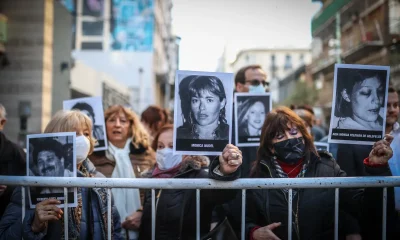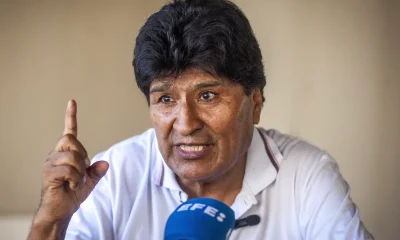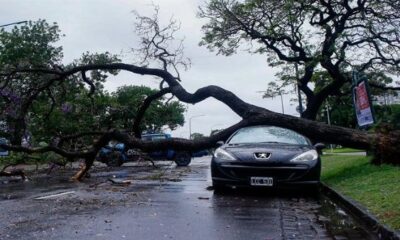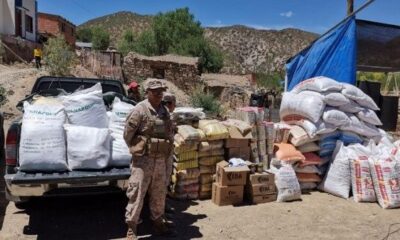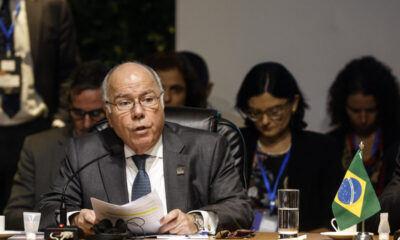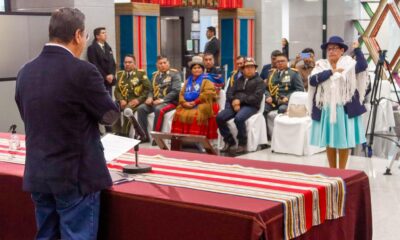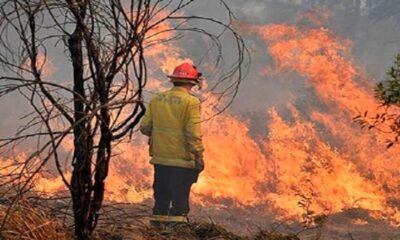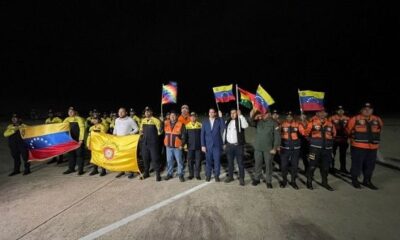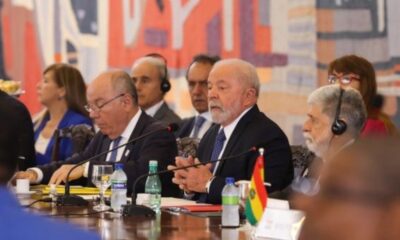International
Bolivia and Argentina promote energy integration
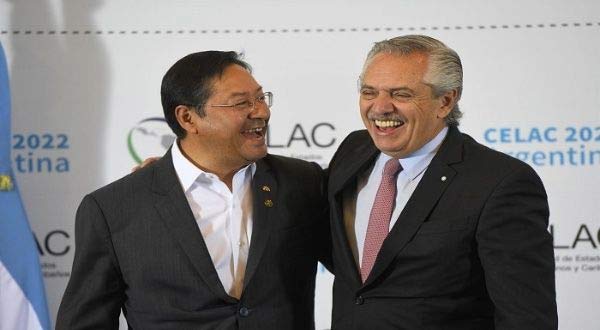
June 1 |
The presidents of Bolivia and Argentina, Luis Arce and Alberto Fernández, respectively, lead today in the department of Tarija the inauguration of the 132 kV Juana Azurduy de Padilla international interconnection power line.
Fernandez arrived this Thursday at the Tarija airport of Yacuiba and went to the town of Yaguacua, where he held a meeting with his peer and host, and later both proceeded to inaugurate the electricity transmission line.
The energy supplier has a length of 120 kilometers (46.49 in Bolivia and 73.88 in Argentina) and connects the Yaguacua substation in Bolivia with the Tartagal substation in Argentina.)
This project will allow the transportation of electric energy from the Andean-Amazonian nation to the neighboring country with an estimated power of 120 megawatts (MW).
The work required an investment of 364 million Bolivianos (US$364 million), concluded in March 2018 in Bolivia and in May 2019 on the Argentine side.
“It is an honor and a joy to receive in Yacuiba, Tarija, our brother president, Alberto Fernández, to deliver a work of great importance for our peoples,” Arce wrote on his Twitter account.
According to the news agency Télam, for Argentina “the import of energy from Bolivia results in an improvement in the voltage levels in the northern area (…), especially at hours of high demand”.
This exporting operation should have started in October 2019, and the works were interrupted in 2020, during the de facto government of Jeanine Áñez.
After the rescue of democracy with the electoral triumph of Arce that same year, in 2021, Empresa Nacional de Electricidad (ENDE) through its subsidiary ENDE Transmisión Argentina S.A. (ETASA), resumed the construction of the section in Argentine territory.
The work was completed in October 2022, after which the line and generation testing stages were carried out.
On March 13 of this year, Bolivia began exporting, for the first time in bilateral history, 60 MW to Argentina with the possibility of reaching up to 120 MW.
Arce and Fernández are currently leading the inauguration ceremony in an evening attended by ministers of both nations, legislators, leaders of social organizations and neighbors of the Chaco region of Yaguacua.
International
Iran Reports 201 Dead, 747 Injured After U.S. and Israeli Strikes

The Iranian Red Crescent Society reported Sunday night (local time) that at least 201 people were killed and 747 injured following attacks carried out by Israel and the United States against the Islamic Republic.
A spokesperson for the humanitarian organization said more than 220 rescue teams have been deployed across affected areas and that relief operations are continuing without interruption. The official highlighted the difficulty of treating the large number of wounded and the urgent need for additional resources in impacted provinces.
Out of Iran’s 31 provinces, 24 have reported damage, according to a statement carried by the Isna news agency. This marks the first overall casualty toll released by Iranian state-affiliated media since the launch of the offensive.
Among the dead are 85 schoolgirls from a school in the southern city of Minab, according to the country’s judiciary. “The number of martyrs at the Minab girls’ school has risen to 85,” the local prosecutor’s office said, as quoted by the judiciary’s website, Mizan Online.
Iranian President Masud Pezeshkian described the attack as a “savagery” that “constitutes a new black page in the record of countless crimes committed by the aggressors.”
Meanwhile, the international community continues to monitor the situation closely amid concerns about possible further reprisals and the broader impact on Middle East stability, energy markets, and global security.
AFP noted that it was unable to independently verify the casualty figures or the circumstances surrounding the events.
International
Pope Leo XIV Urges End to ‘Spiral of Violence’ in Middle East

Pope Leo XIV on Sunday called for an end to the “spiral of violence” in the Middle East, following military strikes by the United States and Israel against Iran and subsequent retaliatory bombardments in the region.
“Faced with the possibility of a tragedy of enormous proportions, I urge the parties involved to assume their moral responsibility and stop the spiral of violence before it becomes an irreparable abyss,” the pontiff told the crowd gathered in St. Peter’s Square at the Vatican.
Speaking during the Angelus prayer, the U.S.-born pope said stability and peace cannot be achieved through threats or weapons. “Stability and peace are not built with reciprocal threats or with arms that sow destruction, suffering and death, but only through reasonable, sincere and responsible dialogue,” he declared.
The leader of the world’s 1.4 billion Catholics also called for diplomacy to “regain its role” amid escalating tensions.
In addition, the pope urged Afghanistan and Pakistan to urgently resume dialogue after several days of clashes between the two countries.
International
Security Council to Hold Emergency Meeting on Middle East Crisis

UN Secretary-General António Guterres on Saturday condemned the “military escalation in the Middle East” following attacks by the United States and Israel against Iran and Tehran’s retaliatory strikes, just hours before an urgent meeting of the UN Security Council.
“I call for the immediate cessation of hostilities and de-escalation,” Guterres said in a statement.
The Security Council is scheduled to meet on Saturday at 21:00 GMT (4:00 p.m. in New York) to address “the situation in the Middle East,” the United Nations announced.
The meeting, during which Guterres will deliver remarks, was convened at the request of France, Bahrain, Colombia, Russia and China, according to a diplomatic source.
-

 International5 days ago
International5 days agoFamily of “El Mencho” Seeks Return of Body After Deadly Military Operation
-

 International5 days ago
International5 days agoLarry Summers Steps Down from Harvard Role Amid Epstein Controversy
-

 International5 days ago
International5 days agoIran’s President Optimistic Ahead of Geneva Nuclear Talks with U.S.
-

 International5 days ago
International5 days agoBill Gates Admits “Serious Mistake” Over Epstein Ties
-

 International5 days ago
International5 days agoStephen Hawking Photo Appears in Newly Released Epstein Documents
-

 International3 days ago
International3 days agoCocaine Production Surges 34% in 2023 as Market Expands into Africa and Asia
-

 International2 days ago
International2 days agoTrump Floats “Friendly Takeover” of Cuba Amid Rising Tensions
-

 International3 days ago
International3 days agoFederal Judge Blocks Trump Policy Allowing Deportations to Third Countries
-

 International16 hours ago
International16 hours agoIran Reports 201 Dead, 747 Injured After U.S. and Israeli Strikes
-

 International2 days ago
International2 days agoArgentina’s Senate Reviews Milei-Backed Labor Overhaul
-

 Sin categoría1 day ago
Sin categoría1 day agoTrump: ‘We Think It’s True’ Amid Claims Iran’s Supreme Leader Was Killed
-

 International1 day ago
International1 day agoSecurity Council to Hold Emergency Meeting on Middle East Crisis
-

 International16 hours ago
International16 hours agoPope Leo XIV Urges End to ‘Spiral of Violence’ in Middle East
-

 International3 days ago
International3 days agoClinton Accuses Republican Committee of Using Epstein Case to Shield Trump















































